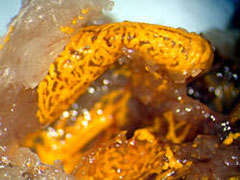Award of Excellence
By Stephanie Roberts
Dr. Miles Johnston, a senior scientist in clinical integrative biology at Sunnybrook Research Institute (SRI), was recently named the recipient of the 2006 Robert H. Pudenz Award of Excellence for Research in Cerebrospinal Fluid Physiology for his pioneering role in helping define the mechanisms of cerebrospinal fluid (CSF) transport in hydrocephalus.
Minneapolis-based Medtronic, Inc. presented Johnston with the award at a reception at the Estates of Sunnybrook on December 5, 2007. There, Johnston, in a gracious acceptance speech, thanked the many people without whom he averred his research would not be possible.
Speaking after the event, Johnston again drew attention to those with whom he has worked over the years. "It was a great privilege to receive the Pudenz award. However, . . . the various students, fellows and technicians who laboured over a 10- to 12-year period deserve most of the credit; without their hard work, the project would never have been a success," he said.
He also credited his colleagues at both SRI and the University of Toronto, in the department of laboratory medicine and pathobiology within which he is a professor. He saved the final toast for his wife, thanking her for her unflagging patience and support.
Johnston’s studies have provided a clearer understanding of the normal mechanism involved in the outflow of CSF and the lymphatic system in the development of hydrocephalus. He was the first to show that CSF is absorbed not through a site in the brain called the arachnoid granulations—the conventional wisdom taught to every medical student—but through the lymphatic system. "We were able to identify the major route by which cerebrospinal fluid is absorbed. This involves absorption into lymphatic vessels located external to the brain in the nasal area. This may be important because a defect in cerebrospinal fluid transport is believed to contribute to hydrocephalus," said Johnson.
Hydrocephalus is a disease wherein too much CSF fluid—which serves to bathe and protect the brain and spinal cord—accumulates in the cranium. Some babies are born with it, but it may also be caused by injury to the brain, infection, bleeding in the brain or stroke. In some cases, it can lead to irreversible brain damage. It can be fatal if left untreated.
The award, although presented by Medtronic, is conferred by past Pudenz award winners, comprised mainly of neurosurgeons. It includes a $7,500 research grant for Sunnybrook and a $1,000 grant for the Hydrocephalus Association in Dr. Johnston’s honour.
PDF / View full media release »


